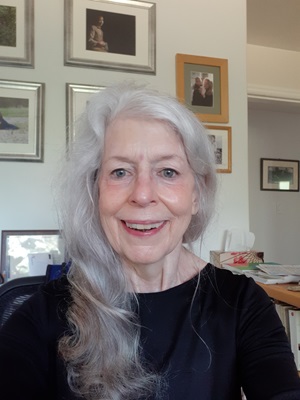
Dear Frank
Contributor’s Marginalia: Lynne Knight responding to Frank Paino’s “The Agnostic’s Prayer”
Dear Frank,
You know I’ve been an agnostic ever since I faced the divide between my father’s atheism and the Dominican nuns who urged me all through high school to pray for the gift of faith. Pray to whom, I would wonder, and still do. Or did, until I read your poem, which offers an answer:
O, you about whom much is said,
but none for certain
The comma after the O stops me. It’s not O God, or O Unknown One, so I hear the O first not as direct address but as a cry against uncertainty. But you don’t let me linger in abstraction. You shift into the aurally and visually rich lyricism that I think of as the hallmark of your work:
are you the glint of evening copper
that sets the river’s face aflame
or the smoke-grey shadows that lengthen
across the backlit transept
of my father’s riddled lungs?
The river’s “face aflame” with the “glint of evening copper” juxtaposed with “smoke-grey shadows / across the backlit transept / of my father’s riddled lungs” brings suffering and death quietly into the poem, and with them, the unanswerable question: What happens after death—something? or nothing?
Stanza by stanza, you juxtapose images of beauty against images of loss or destruction. The music becomes more resonant, even full of meaning:
Do you incense autumn
wind with the must of grapes
plucked from the vine,
or is your breath the roil of earth
and mud that flattens cities
when the levees finally crumble?
To me, the repetition of the uh sound reenacts uncertainty itself. Uh, uh, uh: Are you this or are you that? But there’s also the perfect use of incense as a verb and then the deft enjambement (just one among several) of “autumn / wind” so that we see and then hear both autumn and its wind.
The interior stanzas advance your prayer in ways that make me grateful to be in the world, no matter what might or might not exist beyond it. But it’s the last part of the last interior stanza that takes the top of my head off every time I read it:
Is it your finger that breezes
the plane of my chest
when I step into summer’s first
shirtless dusk [. . .]
Such strikingly intimate moments: The unidentifiable you touches you with a finger when you step into a “shirtless” dusk, an image so startling in its defiance of expectation (it’s not “I step shirtless”) that I gasped when I first read it—and then I said, aloud, Wow! But Wow! is really how I feel about the whole poem.
I love that you shift immediately from that dazzlement back to that opening O, matching the plain language of the first stanza to the last:
O, you who may or may not be
all, or any, or none of the above
I attend at this strange equator
that divides if from is,
I am from I am
not,
I seek from I have found.
It seems right that you bracket the poem’s rich interior with stanzas whose language is so unadorned—until that “strange equator,” a visual recapitulation of the underlying divide: Are you this or are you that?
About that one-word line: not. I probably would have ended the poem there, opting for an ironic certainty—and betraying the poem. The beauty is that you knew to end your prayer without violating the mystery at its heart.
Bravo, my friend.
Lynne
